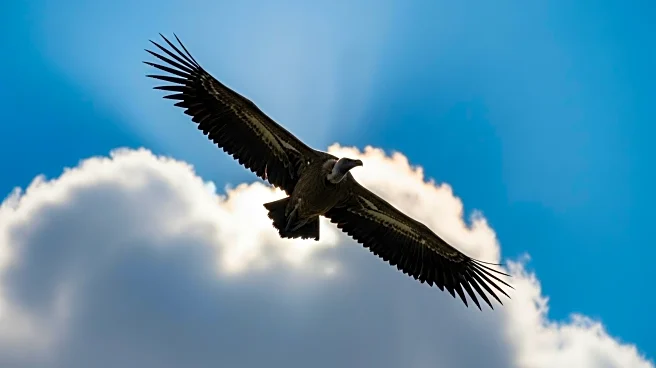What's Happening?
Israel's population of Eurasian griffon vultures is critically endangered, with only around 200 birds remaining. Conservation experts, including Prof. Or Spiegel from Tel Aviv University, are working to protect the species through various measures such as satellite tracking and feeding stations. These vultures play a vital ecological role by cleaning up carcasses and preventing the spread of disease. However, they face significant threats from poisoning, electrocution, and disturbances to nesting sites. The Israel Nature and Parks Authority is actively involved in conservation efforts, including breeding centers and wildlife hospitals.
Why It's Important?
The decline of griffon vultures in Israel highlights the broader environmental challenges facing the region. These birds are crucial for maintaining ecological balance by consuming carcasses, which helps prevent disease outbreaks. Their disappearance could lead to increased stray animal populations and associated health risks, as seen in other regions like India. The conservation efforts are essential not only for preserving biodiversity but also for safeguarding public health and maintaining ecological stability. The situation underscores the need for sustainable practices and increased awareness to protect endangered species.
What's Next?
Continued conservation efforts are necessary to prevent the extinction of griffon vultures in Israel. The public is encouraged to report injured vultures and avoid using poisons that could harm these birds. Researchers will continue to monitor vulture movements through satellite tracking to better understand their behavior and address threats. The Israel Nature and Parks Authority plans to enhance its conservation programs, potentially including the importation of vultures from abroad to bolster the population. Long-term strategies will focus on mitigating climate change impacts and ensuring safe habitats for these birds.
Beyond the Headlines
The plight of the griffon vultures in Israel reflects broader environmental and ethical concerns. The use of poisons and habitat destruction not only threaten wildlife but also raise questions about human responsibility towards nature. The conservation efforts serve as a reminder of the interconnectedness of ecosystems and the importance of preserving natural habitats. Additionally, the cultural significance of vultures as symbols of strength and freedom adds an ethical dimension to their conservation, emphasizing the need for a balanced approach to wildlife management.









